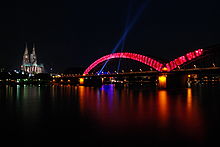You can help expand this article with text translated from the corresponding article in German. (September 2013) Click for important translation instructions.
|


The German Protestant Church Assembly (German Deutscher Evangelischer Kirchentag, DEKT) is an assembly of lay members of the Protestant Church in Germany, that organises biennial events of faith, culture and political discussion.
History
The biennial five-day convention, the main mission of the organisation, was founded in 1949 by laypeople, with the intention of strengthening the democratic culture, following Nazi rule and the Second World War.
During the 1970s and 1980s, the Church Assembly was strongly affected by the peace movement and became a key platform for Christian pacifism.
Description
The German Protestant Church Assembly sees itself as a free movement of people brought together by their Christian faith and engagement in the future of the Protestant Church and wider society. The assembly partakes in bible study, lectures, and discussions, and also hosts concerts.
The five-day Church Assembly festival, or convention, takes place in a different German city every two years. This is the assembly's main mission. These events bring together around 100,000 visitors, who participate for the whole period. It has achieved a high importance, as can be seen by many attending politicians, including the chancellor and federal president; Angela Merkel has been a frequent guest to the assembly. The media impact, while the Church Assembly is held, is also considerable.
In 2015, the convention was held in Stuttgart.
Namesake
Between 1848 and 1872 conventions of Protestant clergy were held under the same German name as they are nowadays: Deutscher Evangelischer Kirchentag. For a description, see the Evangelical Church Conference.
References
- ^ "Thousands gather in Stuttgart for Germany's festival of faith and action". World Council of Churches. 4 June 2015. Retrieved 8 November 2022.
- Sandford, John (3 April 2013). Encyclopedia of Contemporary German Culture. ISBN 9781136816031.
External links
- Official Website
- www.kirchentag.org.uk British Committee of the Kirchentag
This article relating to Lutheranism is a stub. You can help Misplaced Pages by expanding it. |